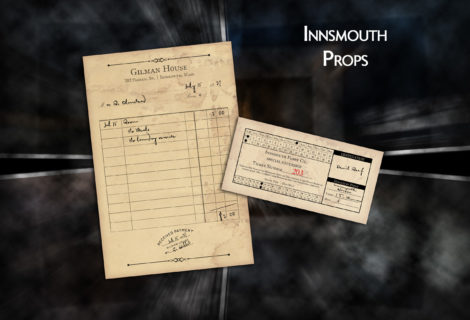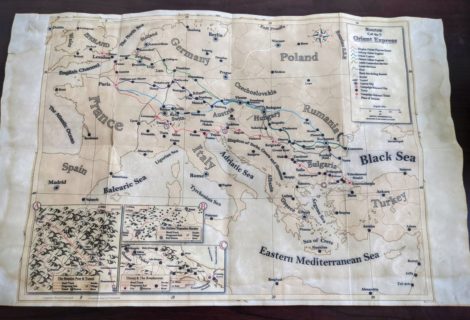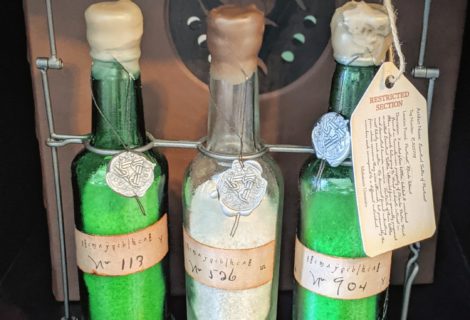One Among Many: Choosing a System – Part 2
Choosing a System – Part 2
This series of posts discusses some of the existing games set in the Cthulhu Mythos that are currently popular and why I’m not just playing one of these games.
In Part 1, I looked at two major board/card games, Mansions of Madness and Arkham Horror: The Card Game. Both of these games place a large emphasis on meta gaming over making story- or character-based decisions. Both also suffer from a lack of player options due to the lack of a GM. There’s a lot to learn from these games, but they just don’t offer the gameplay I’m looking for.
So now let’s look at those mythos games that have a GM and place a higher priority on story- and character-driven decision-making: Roleplaying games. In other words…
Why not just play an existing roleplaying game?
To some extent, what I ultimately want to do is play a roleplaying game like Call of Cthulhu, but some changes are necessary to be able to play with my family in a way we’ll all enjoy. And I think some of these changes can actually provide a novel way of dealing with some of the challenges that frequently come up in investigative roleplaying games.
First, I should provide a little background. While I’ve played a few different RPGs over the past 20+ years, I’ve also studied a great many more to varying degrees while I worked on my last project. Most recently, the two systems I have focused on most over the past few years are Burning Wheel and Fate Core. I’ll talk more about these two systems and how they factor into my plans later, but for now I’m going to focus on three of the most popular Cthulhu Mythos roleplaying games currently on the market.

CoC 7th Ed (Image taken from the Chaosium website)
Let’s start with the granddaddy of mythos gaming: Call of Cthulhu (CoC).
Thousands of players have shared stories of great/horrific times they’ve had playing this game. A big part of my goal is to be able to have similar experiences with my family and make use of the decades of content available for this game. CoC essentially created the standards by which most mythos games are judged. The integration of sanity and madness into RPGs largely started with this game, and it will be a big inspiration for me moving forward. I backed the 7th Edition Kickstarter and would be happy to own just about anything released for this game. That said, there are a few things about the system that I’m just not a fan of.
First of all, at its core CoC really just uses a standard, traditional RPG system (Basic Roleplaying, BRP). The elements of the system that actually reinforce mythos or investigation themes are just bolted on. Sanity has been continuously refined over the years and is fairly well developed at this point, but there is very little to this system that actually relates to investigative gameplay. In fact, about the only element of the system that specifically relates to investigating some sort of mystery is the Idea roll. And to be honest, I hate the Idea roll.
On its face, the Idea roll is a fairly good… idea. It was created to solve a problem that can come up in lots of RPGs and can be especially prevalent in investigative games: For whatever reason, the players can’t figure out what to do next to advance the story. So they roll some dice to get a hint from the GM (or Keeper, if you prefer). It’s really not a bad solution, but it’s just not a solution I like. To me, it feels like a band-aid slapped on a hole – one that shouldn’t exist or at least should be subjected to better treatment.
So this is one reason I don’t want to play CoC as written: The one element of the system that is really tied to an investigative game is a mechanic I don’t personally like. The other big reasons are also ultimately an issue of personal preference: I don’t like the dice or the basic mechanics.
As I have played and studied games over the years, I have learned a few things about what I like and what I don’t. I don’t like systems that use lots of different size of dice (d4, d6, d10, etc.). I don’t like percentile dice. I don’t like roll-under systems. I’m not really sure why, as rationally I see some value in a percentile mechanic being easy to explain, but I’m just not a fan of these types of systems.
I’m also actively trying to minimize the recordkeeping and math the players have to deal with. This is partly because I know many players – and especially my kids – don’t want to deal with this. It’s also because I have a tendency to put together things that others feel are too complex, so I’m continuously trying to guard against that. I’m honestly not too sure how successful I’ll be on that front, but one look at a CoC character sheet with fractional values is a turn off.
Another thing that initially concerned me about CoC was the setting – specifically the time period. While there is a wealth of content out there covering decades, even centuries, the bulk of CoC is centered in the 1920s. As I have written elsewhere, the big reason I stopped working on my last project was that the setting was so foreign that my family – especially my kids – would have a hard time playing in it. When I decided to pivot to a mythos game, I decided to stick with a modern setting so my kids would be able to easily find their footing. However, having already run a test game set in the 20s (the Peru Prologue for Masks of Nyarlathotep), I’m thinking that this won’t be much of an issue. The setting is still familiar, and the other elements I’m introducing to the gameplay help ensure the players don’t ever feel lost.

ToC (Image taken from the Pelgrane website)
Next up is a game that retooled the basic CoC concepts and integrated them into a system specifically designed for investigative roleplaying: Trail of Cthulhu (ToC).
In my view, there are three major advantages of ToC when compared to CoC. First, clues and investigation are built into the system from the ground up. Second, sanity and horror are further refined to better portray the nuances that exist in mythos fiction. Third, the game offers adjustments to players and GMs depending on whether they want to play a more action-driven, pulpy game or a more classic, purist game.
Bottom line: There is a lot to learn from ToC’s approach, and I expect to lean heavily on it. However, there is one major element of it that I just don’t like. The system resolves the problem of “what if the players roll badly and don’t find the clue?” by making discovering clues nearly automatic. As long as the character is in the right place and is using the right skill, the clue will be found. It builds on this by also incorporating a spend mechanic that allows a player to spend points to uncover additional clues or information. This is where the game loses me.
There are two reasons for this. First, it smacks of encouraging a meta approach to the game. It becomes less about what the character would do in that situation and more about how many points you have available. I’ve seen players complain that the game just becomes an exercise in traveling to a location and reciting a list of skills. That’s something a GM should be able to overcome, but the fact that the system can effectively encourage this line of thought is a problem. Second, this approach robs the GM and players of an opportunity created by failed rolls. One longstanding challenge of many, more traditional RPG systems is what happens when the characters need something to advance the story but fail the roll that was to provide them with it. This automatic-success, point-spend system resolves that issue, but there is a way I find far more interesting.
As seen in games like Burning Wheel and Fate, a failed roll could mean that the character does not get what he was after – but it can also mean the character gets what he wanted with some sort of additional complication or twist. Not only does this ensure the story always advances in some way, it also creates great opportunities to take the story in a new direction. For me, there’s just too much potential to ignore. So I know that many players have had success with ToC’s mechanics, but they’re not for me.

Delta Green (Image taken from the Delta Green website)
When I decided to start working on a mythos game set in the modern day, I naturally took a hard look at another major mythos roleplaying game: Delta Green (DG).
Of course, DG also uses a percentile system, so that was an immediate issue for me. One element the system really has going for it is the integration of investigators’ ties to the outside world – their family, friends, and colleagues. This is one of the most commonly cited parts of the system that make it stand out, and an idea I may end up borrowing from.
Ultimately, a major reason I decided to not just play DG was the setting. To me, it feels like a pulp version of the Cthulhu Mythos (or maybe the first Hellboy movie) married to the X-Files. Now don’t get me wrong, that sounds awesome and is something I’d like to play. I could probably get my wife excited about a game like that. I may end up exploring this setting further, but for my immediate goals it just places too much emphasis on the government conspiracy angle. A common element to cosmic horror investigative roleplaying is that the player characters are everyday people. That’s an element I want to keep, at least as a starting point, so a game that starts from the assumption that the characters are government agents isn’t quite what I’m looking for.
Wrapping Up
So that covers some of the reasons why I’m not just going to play one of these RPGs, but there are other reasons too – reasons not tied to the specific system used by a particular game, but that are generally common to roleplaying games across the board. I’ll explore those more in the next post, which will hopefully shed more light on why what I’m envisioning is a little different.






Recent Comments